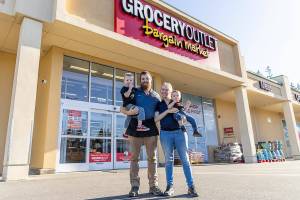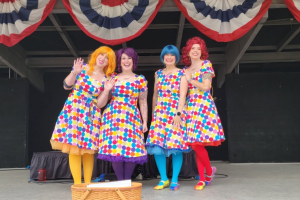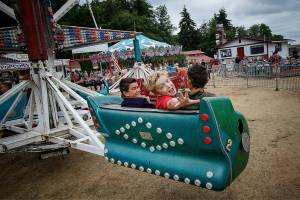The early 20th century Japan Bazaar on Hewitt Avenue
Published 1:30 am Tuesday, May 30, 2017


By Mindy, Everett Public Library staff
May is Asian/Pacific American Heritage Month. This is an opportunity to pay tribute to the generations of Asian and Pacific Islanders who have enriched America’s history — at the national, state, and local level. Asian Americans have a complex and difficult history in the Northwest since the mid-19th century, when waves of immigrants began arriving from China, Japan, and the Philippines.
Today, we are sharing one striking image from our Northwest History collection: a portrait of the Chinese Kan family inside their Hewitt Avenue business, the Japan Bazaar. This compelling image from the summer of 1907 offers a glimpse inside their lives and hints at the complexities and conflicts this community may have faced in early 20th century Everett.
Although we do not have a full history of the Kan family or their business, we are able to stitch together pieces of their story based on the image and other Everett Public Library resources such as: oral histories, Polk’s City Directories, Everett Herald archives, and genealogical and archival databases.
As the Northwest region’s Asian population grew, so too did anti-immigration hostilities and policies. Chinese immigrants in California and Washington faced discriminatory taxes, prohibitions against marrying white people, and owning land. In 1882, Congress passed a national Chinese Exclusion Act to restrict Chinese immigration entirely. Chinese populations were expelled from Seattle and Tacoma in 1885 and 1886.
It was amidst this culture of anti-Chinese fears and policies that Charles Kan and his wife, Beam Owyong Kan, arrived in the Pacific Northwest.
We know that the Charles and Beam Kan family arrived in Everett from China by way of Portland, Tacoma, and Seattle, but it is unclear when and why they first immigrated to the United States. Like many Chinese immigrants, they may have felt a combination of push and pull factors that caused them to seek a better life in the United States.
The earliest record of Charles Kan is from 1892, when he was identified as a merchant from Japan in the Washington state census. This description matched his listing in the 1892 Seattle city directory as a purveyor of Japanese goods. The Kans operated Everett’s “Japan Bazaar” on Hewitt Avenue, from 1901 to 1910.
Birth records indicate that the oldest Kan children, Samuel and Ruth, were born in Portland, Oregon, in 1897 and 1899. The youngest two children, Mary and John, were born in Everett, in
1904 and 1907. Unlike the 1892 census records, all other readily available public records indicate Chinese—not Japanese—ancestry.
The family moved back and forth between Oregon and Washington cities for many years before arriving in Everett. In some years, Charles Kan operated his own business. In others, he clerked for Andrew Kan, an importer primarily based in Seattle. While Charles Kan seems to have consistently marketed his business as Japanese, Andrew Kan’s businesses varied between Chinese, Japanese, and simply “Oriental.” This fluid ethnic identity may have been a simple marketing tactic designed to sell more goods. Or, perhaps, it was a response to heightened tensions facing Chinese immigrants.
When the Kans arrived in Everett in 1901, the city was less than a decade old. Brimming with economic and industrial opportunities, it attracted an influx of immigrants and job-seekers during the first decade of the 20th century. On November 21, 1901, the Everett Daily Herald announced the opening of Charles Kan’s Japanese Bazaar on Hewitt Avenue. On the next page, the Herald ran a story entitled, “Says Keep the Heathen Out.” The article described President Roosevelt’s attitude toward the policy of Chinese exclusion: “The heathen has been slipping in…either by stealth or bribery of immigration officials…”
In this environment of prosperity, opportunity, and overt hostility, it is unsurprising that the Chinese family wanted to pass as Japanese, a more culturally and politically acceptable ethnicity at the time.
In December of 1907, a few months after our photo was taken, the Everett Daily Herald featured the store in an article on Christmas shopping. They author described the busy manager, Mr. Kan, peddling a colorful range of affordable, quality products for all ages, such as “humming tops and other amusing toys for children, delicate drawn work, embroider, brasses, ivories, paintings on silk, cigar cases, match safes and countless other artistic oddities…” The writer was enthusiastic about the store’s exotic Japanese atmosphere. He described a “fairyland to be sure in these purely Oriental windows” before enthusing: “one may almost see the cherry blossoms fall from imaginary trees and hear the soft tones of busy Japanese in far off Mikadoland…” The Herald writer seemed perfectly convinced of the Japan Bazaar’s authenticity.
In a 1975 oral history interview, Rita Yeo Richmond, an early Everett pioneer and the daughter of a local business owner, reminisced about visiting the Japan Bazaar as a child. According to Rita, the other business owners in town all knew—and accepted—that the Kan family was Chinese, not Japanese. She recalls:
And then there was a Chinese store. Did anybody speak of that? That was nice. He stayed open until nine o’clock in the night, and my dad used to take us down there. And oh, he had so many Chinese things. Big store. He had a little girl named Ruth and a boy named Sam. My dad used to go down there real often, and was real friendly with them, you know. In Everett they wouldn’t allow a Chinese in at that time. But he kind of posed as something—as a Jap or something. But anyhow, my dad got talking to other merchants in town, and they all thought he was so wonderful that they should let him stay, you know. So they let him stay. They kept it hush.
Sometime between 1910 and 1912, after a decade in Everett, the family moved back to Seattle, and then, eventually to Los Angeles, California. Although the Kan family’s story remains largely unknown, they nevertheless filled a unique role and left a mark on the business community of early Everett.
Recommended reading on early 20th Century Chinese and Japanese American experiences in the Northwest:
Reflections of Seattle’s Chinese Americans: the First 100 Years
Dreams of the West: a history of the Chinese in Oregon, 1850-1950
Subverting Exclusion: Transpacific Encounters with Race, Caste, and Borders, 1885-1928
Be sure to visit the Everett Public Library blog for more reviews and news of all things happening at the library.






